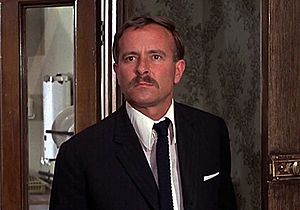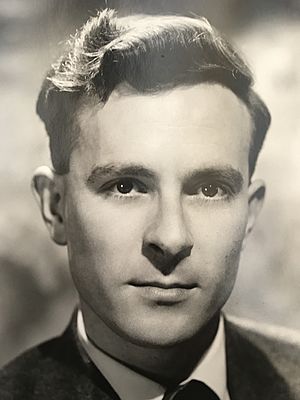Alec McCowen facts for kids
Quick facts for kids
Alec McCowen
|
|
|---|---|
 |
|
| Born |
Alexander Duncan McCowen
26 May 1925 Tunbridge Wells, Kent, England
|
| Died | 6 February 2017 (aged 91) London, England
|
| Nationality | British |
| Other names | Alex McCowen |
| Education | Skinners' School |
| Alma mater | Royal Academy of Dramatic Art |
| Occupation | Actor |
| Years active | 1942–2002 |
| Partner(s) | Geoffrey Burridge (– 1987; his death) |
Alexander Duncan McCowen (born May 26, 1925 – died February 6, 2017) was a famous English actor. He was known for his many roles in movies and plays.
Contents
Early Life
Alec McCowen was born in Tunbridge Wells, a town in Kent, England. His mother, Mary, was a dancer, and his father, Duncan, was a shopkeeper.
He went to The Skinners' School in Tunbridge Wells. His friends at school called him 'Squeaker'. Later, he studied acting at the Royal Academy of Dramatic Art.
Acting Career
Starting in Theatre
Alec McCowen first acted on stage in August 1942. He played Micky in a play called Paddy the Next Best Thing in Macclesfield.
From 1943 to 1945, he performed in plays in York and Birmingham. He also toured India and Burma with a play during World War II.
In 1950, he made his first appearance in London. He then performed in New York City in 1951. He slowly became more successful in plays like Moulin Rouge and The Matchmaker.
Joining Famous Theatre Companies
In 1959, Alec McCowen joined the Old Vic Company. He played important roles like King Richard II in Richard II. He also played Mercutio in Romeo and Juliet and Malvolio in Twelfth Night.
He joined the Royal Shakespeare Company in 1962. With this company, he toured the Soviet Union, Europe, and the United States. He played the Fool in King Lear alongside famous actor Paul Scofield.
Later Theatre Successes
A big moment in his career was in 1968 when he played Father William Rolfe in Hadrian the Seventh. He won an award for Best Actor in London and was nominated for a Tony Award on Broadway.
In 1970, he starred in the play The Philanthropist. This play was very popular and ran for three years. He won another award for his performance in New York.
He also had great success with the Royal National Theatre. In 1973, he won an award for his role in Molière's The Misanthrope. He then played a psychiatrist in the first-ever performance of Equus.
Alec McCowen created his own one-man show where he performed the entire St. Mark's Gospel. This show was praised around the world and earned him another Tony Award nomination.
In 1982, he gave a powerful performance as Adolf Hitler in a play called The Portage to San Cristobal of A.H.. Critics called it one of the greatest acting performances they had ever seen. He won his third Best Actor award for this role.
Two years later, he played the British poet Rudyard Kipling in another one-man play. He performed this play on Broadway and on television.
Directing Plays
Alec McCowen also directed plays. In 1987, he directed three short plays called Definitely the Bahamas. Critics praised his directing skills.
He also directed a play called While the Sun Shines in 1972.
Film and Television Roles
Alec McCowen's first movie was The Cruel Sea in 1953. He appeared in many other films, including:
- A Night to Remember (1958)
- Alfred Hitchcock's Frenzy (1972)
- Travels with My Aunt (1972), for which he was nominated for a Golden Globe Award.
- Never Say Never Again (1983), a James Bond movie where he played 'Q'.
- Henry V (1989)
On television, he performed his one-man show of The Gospel According to Saint Mark in 1979. He also appeared in the BBC Television Shakespeare series. In the mid-1980s, he starred in the TV series Mr. Palfrey of Westminster as a "spy catcher".
In 1989, he was featured on the TV show This Is Your Life. He was annoyed when something important to him was not mentioned, but the issue was later resolved.
Books He Wrote
Alec McCowen wrote two books about his life. The first was called Young Gemini (1979), and the second was Double Bill (1980).
Personal Life
His close friend and fellow actor, Geoffrey Burridge, died in 1987.
Death
Alec McCowen passed away on February 6, 2017, at the age of 91.
Filmography
|
|
List of Theatre Roles
- Sir Henry Harcourt-Reilly in The Cocktail Party, Phoenix Theatre, 1986
- Nikolai in Fathers and Sons, National Theatre, 1987
- Vladimir in Waiting for Godot, National Theatre, 1987
- Harry Rivers in Exclusive, Strand Theatre, 1989
- George in A Single Man, Greenwich Theatre, 1990
- Jack in Dancing at Lughnasa, Abbey Theatre, Dublin and National Theatre, 1990-1991
- Caesar in Caesar and Cleopatra, Greenwich Theatre, 1992
- Michael in Someone Who'll Watch Over Me, Hampstead Theatre, Vaudeville Theatre, and Booth Theatre (New York), 1992-1993
- Edward Elgar in Elgar's Rondo, RSC The Pit, 1994
- Prospero in The Tempest RSC Barbican Theatre, 1994
- Reginald Pager in Quartet, Yvonne Arnaud Theatre and Albery Theatre, 1999-2000
Honours
Alec McCowen was recognized for his acting talent. He was made an Officer of the Order of the British Empire (OBE) in 1972. Later, he was promoted to Commander of the Order of the British Empire (CBE) in 1986. These are special awards given by the British monarch.
A special service was held for McCowen at St. Paul's Church in Covent Garden in 2017. This church is often called "the actors' church." Many people shared memories and tributes to him. A plaque was placed in the church to remember him.
See also
 In Spanish: Alec McCowen para niños
In Spanish: Alec McCowen para niños
- Tale Spinners for Children
 | Anna J. Cooper |
 | Mary McLeod Bethune |
 | Lillie Mae Bradford |


